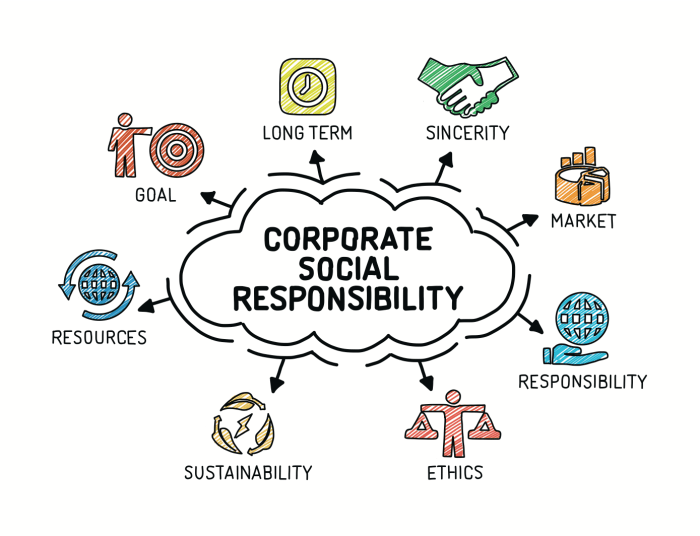Corporate social responsibility is a crucial aspect of modern business practices, shaping how companies interact with society and the environment. From strategies to benefits, let’s delve into the world of CSR.
Definition of Corporate Social Responsibility

Corporate Social Responsibility (CSR) in the business context refers to a company’s commitment to operate in an economically, socially, and environmentally sustainable manner. It involves taking responsibility for the impact of their activities on customers, employees, communities, and the environment.
Examples of CSR Initiatives
- Donating a percentage of profits to charitable organizations
- Implementing environmentally friendly practices such as recycling and reducing carbon emissions
- Offering fair wages and benefits to employees
- Participating in community service projects and volunteering
Importance of CSR in Today’s Business Landscape
CSR is crucial in today’s business landscape as it helps companies build a positive reputation, attract and retain customers, and retain top talent. By engaging in CSR initiatives, companies can also contribute to the well-being of society and the environment, creating a more sustainable future for all.
Benefits of Corporate Social Responsibility
Corporate Social Responsibility (CSR) initiatives come with a wide array of benefits for companies that choose to engage in them. Not only do these activities positively impact society and the environment, but they also have several advantages for the companies themselves.
Enhanced Reputation
Engaging in CSR activities can significantly improve a company’s reputation. By showing a commitment to social and environmental causes, companies can build trust with customers, employees, and the community. This positive image can set them apart from competitors and attract more stakeholders to support their business.
Long-Term Sustainability and Profitability
CSR initiatives can contribute to the long-term sustainability and profitability of a company. By investing in sustainable practices, such as reducing carbon emissions or promoting ethical sourcing, companies can mitigate risks related to environmental regulations and resource scarcity. Additionally, by aligning their values with those of their customers, companies can build a loyal customer base that supports their business in the long run.
CSR Strategies and Implementation
Implementing CSR programs requires thoughtful strategies to align with a company’s core values and business goals. Companies must navigate challenges to ensure the success of their CSR initiatives.
Various CSR Strategies, Corporate social responsibility
- Engaging in philanthropic activities such as donations to charitable organizations.
- Implementing environmentally friendly practices to reduce carbon footprint.
- Supporting local communities through volunteer programs and partnerships.
- Ensuring ethical labor practices and fair wages for employees and suppliers.
Aligning CSR Initiatives with Core Values and Business Goals
Companies can align CSR initiatives with their core values by integrating social and environmental considerations into their business operations. By prioritizing sustainability and social impact, companies can build a positive reputation and strengthen customer loyalty.
Challenges in Implementing CSR Strategies
- Balancing financial resources between CSR initiatives and profit-making activities.
- Ensuring transparency and accountability in reporting CSR outcomes.
- Managing stakeholder expectations and addressing conflicting interests.
- Adapting to changing regulations and societal expectations regarding CSR practices.
Impact of CSR on Society and the Environment

In today’s world, Corporate Social Responsibility (CSR) initiatives play a crucial role in shaping the impact of businesses on society and the environment. These initiatives go beyond profit-making goals and focus on creating a positive change in the world.
When companies invest in CSR projects, they can have a significant impact on local communities and the environment. By supporting education, healthcare, and sustainable practices, businesses can uplift communities, improve quality of life, and protect natural resources.
Examples of Successful CSR Projects
- One notable example is Patagonia’s commitment to environmental sustainability. The outdoor clothing company not only produces eco-friendly products but also supports grassroots environmental organizations through grants and partnerships.
- Another successful CSR project is Microsoft’s YouthSpark program, which aims to provide technology education and job opportunities to young people around the world. This initiative has empowered thousands of individuals to build a better future for themselves.
- Procter & Gamble’s Children’s Safe Drinking Water program is yet another impactful CSR project that addresses the global issue of clean water access. By distributing water purification packets, the company has helped save countless lives in communities facing water scarcity.
Role of Companies in Promoting Social and Environmental Sustainability
- Companies have a responsibility to not only minimize their negative impact on society and the environment but also actively contribute to positive change. Through CSR initiatives, businesses can leverage their resources and influence to address pressing social and environmental issues.
- By integrating sustainability practices into their core operations, companies can set an example for others in the industry and drive systemic change. This can lead to a ripple effect, inspiring more businesses to prioritize social and environmental sustainability.
- Ultimately, the role of companies in promoting social and environmental sustainability through CSR is essential in creating a more equitable, resilient, and sustainable future for all.





